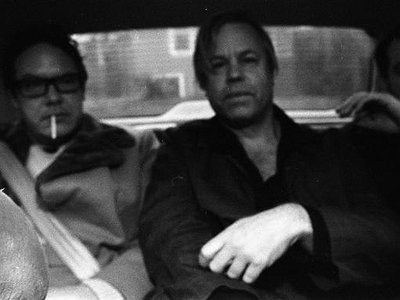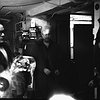Part 1
Name: Steve Schmitt, Dave Abramson, Simon Hennman,
Nationality: North American
Occupation: Musician
Bands/Projects: Diminished Men
Labels: Abduction / Bowels of Lunacy
Musical Recommendations: Seattle based guitarist composer Rick Szabo / Saxophonist composer Eddie Gale
DA: Steve and I starting working on music together in 2002/2003, but we didn't fully form Diminished Men until 2005 or so. At that time I was into jazz, surf and instrumental soundtrack cuts. My friend Gary Siperko had this killer high-octane surf/garage band called The Mofos along with drummer Brian Wilson and bassist Eric Trichon. Gary hipped me to The Shadows, The Pyramids, Link Wray, the "Back From The Grave" compilations, reverb tanks and musicians like Heitor Villa-Lobos and Anton Karas. I learned a lot about drum mechanics, tone and style by being around Brian's playing. At the same time I was also improvising a lot, listening to Derek Bailey, Han Bennink, Roland Kirk, Ed Blackwell & Don Cherry duos, as well as stuff like David Axelrod, U.S. Maple, Erik Satie.
What do you personally consider to be the incisive moments in your artistic work and/or career?
DA: We can't remember.
What are currently your main compositional- and production-challenges?
DA: We have always morphed slowly and naturally into different directions by drawing from new influences and creating alternate ways of writing. Right now, artistically, it feels like we are making a bigger shift, so figuring out how to make a faster transition could prove to be a challenge.
What do you usually start with when working on a new piece?
DA: We usually start with a bong hit... or maybe a nice glass of Chardonnay by the fireplace...hahaha.... Steve typically writes a theme or melody and Simon and I will arrange the tune and create other sections based on the original themes. There have been albums where Steve has come in with almost all of the songs completed, but these days it's mostly all of us arranging his ideas together. Simon and I have both written songs for the band but it's primarily Steve and his idiosyncratic approach that we revolve around.
How strictly do you separate improvising and composing?
SS: We generally have compositions and to varying degrees there is room for improv. A few tracks have whole sections carved out for extended improvs.
SH: Yeah, some tunes are open ended in that we know that specific things will happen in a specific order, but there might be sections that are totally improvised butted up against sections that are totally worked out. Even in the through composed songs there’s always a little wiggle room to maybe inflect a phrase differently or do something a little weirder with it when we’re performing. I like when people tell us that they don’t know what was improvised and what was written out.
How do you see the relationship between sound, space and composition?
SH: Composition is the placement of sound in space/ time. They’re all intertwined and interdependent.
Do you feel it important that an audience is able to deduct the processes and ideas behind a work purely on the basis of the music? If so, how do you make them transparent?
SH: No, I think the music has to stand on it’s own aesthetically without relying on the process being evident. I like the not knowing and the haziness and ambiguity in what we’re doing. I like when the meaning of what we’re doing is elusive even to us, sometimes it can take years to figure out the layers of meaning in something.
In how much, do you feel, are creative decisions shaped by cultural differences – and in how much, vice versa, is the perception of sound influenced by cultural differences?
SH: Creative decisions, at least in the US, aren’t as strongly influenced by cultural differences as they were before the Internet. Things like a regional sound have all but disappeared. Bands all over the US sound like they could be from anywhere, whereas in the past there were regional sounds and scenes. When you have access and exposure to any kind of music at any time like we have now, the cultural differences seem to have less weight.
DA: Yeah, but even if a band is being informed by music from the other side of the planet it typically comes out different, sometimes hollow. So in that sense, the cultural differences play a major role in the depth and spirit of the music.






